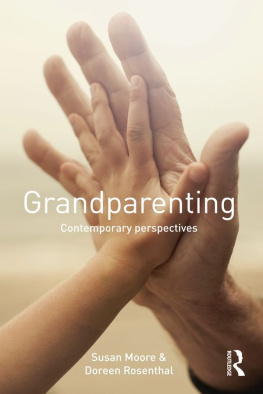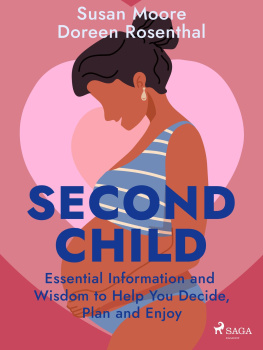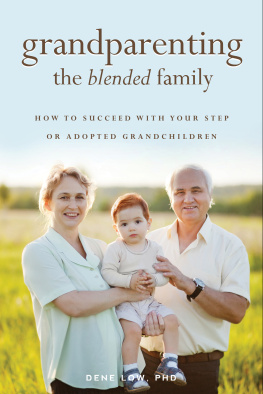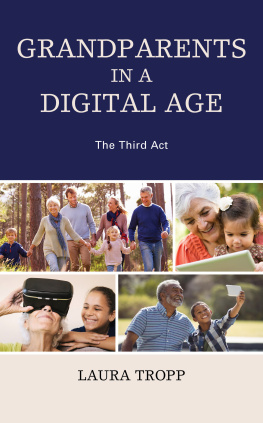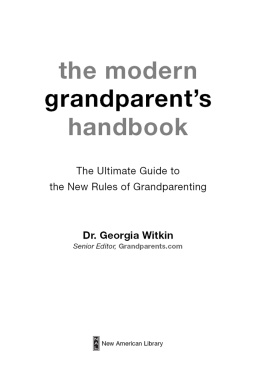Grandparenting
Grandparenting: Contemporary perspectives is one of the first books of its kind to offer a dedicated account of the social and psychological research on this important life stage. Reflecting the contemporary positive approach to ageing, it covers many of the issues that impact the grandparent experience today, such as caregiving and changing family structures, to reveal the health and well-being benefits of the grandparent role. It examines biological, psychological, social/familial, gender, cultural and economic dimensions to map out the current landscape in this emerging field.
Moore and Rosenthal draw on quantitative and qualitative, experimental, survey, observation and case study research, including unique data on grandfathers. They examine how people respond to the challenges and possibilities of grand -parenting, and how this influences intergenerational relationships and adapting to growing older. The book provides a comprehensive, up-to-date evidence base for students in health, sociology and psychology and those interested in gerontology and the lifespan.
Susan Moore is Emeritus Professor, Department of Psychological Sciences, Swinburne University of Technology, Australia.
Doreen Rosenthal is Emeritus Professor, Melbourne School of Population and Global Health, The University of Melbourne, Australia.
Grandparenting
Contemporary perspectives
Susan Moore and Doreen Rosenthal
First published 2017
by Routledge
2 Park Square, Milton Park, Abingdon, Oxon OX14 4RN
and by Routledge
711 Third Avenue, New York, NY 10017
Routledge is an imprint of the Taylor and Francis Group, an informa business
2017 Susan Moore and Doreen Rosenthal
The right of Susan Moore and Doreen Rosenthal to be identified as authors of this work has been asserted by them in accordance with sections 77 and 78 of the Copyright, Designs and Patents Act 1988.
All rights reserved. No part of this book may be reprinted or reproduced or utilised in any form or by any electronic, mechanical, or other means, now known or hereafter invented, including photocopying and recording, or in any information storage or retrieval system, without permission in writing from the publishers.
Trademark notice: Product or corporate names may be trademarks or registered trademarks, and are used only for identification and explanation without intent to infringe.
British Library Cataloguing in Publication Data
A catalogue record for this book is available from the British Library
Library of Congress Cataloging in Publication Data
Names: Moore, Susan, 1945 author. | Rosenthal, Doreen, 1938 author.
Title: Grandparenting: contemporary perspectives/Susan Moore and Doreen
Rosenthal.
Description: New York: Routledge, 2017. | Includes bibliographical
references.
Identifiers: LCCN 2016010839 (print) | LCCN 2016033931 (ebook) | ISBN
9781138640337 (hardback: alk. paper) | ISBN 9781138640344 (pbk.: alk.
paper) | ISBN 9781315636719 (ebk) | ISBN 9781315636719 (Ebook)
Subjects: LCSH: Grandparenting. | Grandparent and child. | Grandparents
Family relationships.
Classification: LCC HQ759.9 .M6196 2017 (print) | LCC HQ759.9 (ebook)
| DDC 306.874/5 dc23
LC record available at https://lccn.loc.gov/2016010839
ISBN: 978-1-138-64033-7 (hbk)
ISBN: 978-1-138-64034-4 (pbk)
ISBN: 978-1-315-63671-9 (ebk)
Typeset in Bembo and Stone Sans
by Florence Production Ltd, Stoodleigh, Devon, UK
To grandparents, past and present
Contents
We would like to thank our colleagues and institutions (the Department of Psychological Sciences, Faculty of Health, Arts and Design at Swinburne University of Technology and the Centre for Womens Health, Gender and Society, Melbourne School of Population Health at The University of Melbourne) for providing the resources that enabled us to complete this book. Special acknowledgement and thanks is due to the grandmothers and grandfathers who generously gave their time and considered thoughts as part of our studies.
We thank our publisher for continuing support and encouragement.
Finally, our thanks once again to Ian and David who sustain us always.
1
Grandparenting
In the theatre, the third act is the time for plot resolution, for pulling the threads or sub-plots together. The third act is now a commonly used metaphor for life, in particular the stage beyond partnering, childrearing and career building. This last third of life is conceived of as a period that provides time and space for consolidating psychological growth and development, reviewing our past and learning from it and, in some cases, using the opportunity for a second chance at friendships, family relationships and fulfilling life goals. It is also, not coincidentally, the time when most of us become grandparents and when our families extend from two to three generations. How we respond to the challenges and possibilities of grandparenting, and how these responses influence both intergenerational relationships and our own adaptation to ageing, form the subject of this book.
Grandparenthood is for millions of people worldwide one of the most positive consequences of later life development, yet research on this topic is only just beginning to accumulate. As the Western worlds population ages, there has been greater interest in gerontology, but much of the ageing research has focused on health- and disease-related aspects of getting older. Now the emphasis is moving toward positive ageing how to make the best of our longer, healthier lifespans and make the most of the third act. Being a grandparent is part of that positive emphasis. Indeed, one of the goals of this book is to highlight and document the very positive contributions that middle-aged and older people can and do make in their role as grandparents, and to suggest ways in which these contributions can be facilitated, extended and acknowledged.
To date, research on grandparenting as a developmental transition, a life stage and an aspect of family functioning has been sparse and most focuses on grandmothers only; issues relating to grandfathers are explored infrequently. This lack of research is surprising, given the huge interest in these topics demonstrated by an avalanche of print and online material (usually anecdotal and unsupported by evidence) dedicated to self-help advice to grandparents and their families. As we know, the context of grandparenting has undergone considerable change in line with social and economic forces. This changed context and its implications is one reason that we need an updated analysis of this important life stage.
Facts and figures
How many grandparents are there in the world? No one knows the answer to that question, but we can make some approximations. The first important fact to take into account is that there are more than seven billion people on the planet and, with declining birth rates and longer life expectancy, were getting older (United Nations, 2013). The global share of people aged over 60 increased from 9.2 per cent in 1990 to 11.7 per cent in 2013, and is predicted to reach 21.7 per cent by 2050, more than 2 billion people. We also know that the average age for becoming a grandparent is quite a bit younger than age 60; even in developed countries such as Britain and the USA, it is more likely to be early 50s, and in developing countries, younger again (Statistic Brain Research Institute, 2014; Womack, 2005). Finally, while not everyone has children and not every parent becomes a grandparent, and there is considerable variation across nations and cultures, estimates suggest that most perhaps around 70 to 80 per cent of older adults do become grandparents. So we are talking about a cohort of almost one billion people on earth who are grandparents right now a formidable force.

